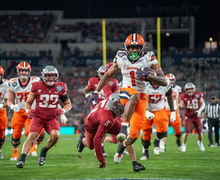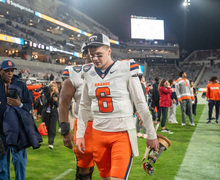‘Pitch’ addresses feminist issues, but has notable shortcomings
Fox’s new addition to its fall rotation, “Pitch,” is an hour-long drama focused on the life and struggles of Ginny Baker. Set in summer, “Pitch’s” story starts on the day of Ginny’s Major League Baseball debut. No woman has ever made it to the Majors in real life, but a few have recently joined professional teams.
It seems like only a matter of time until a real-life Ginny makes her way to the top tier of professional baseball. In this basic context, “Pitch” seems like a well-timed forecast. How will the media handle a woman in men’s professional sports? What pressures, societal and athletic, will she face? What misogynistic barriers exist within these sports and how can they be defeated?
Like many network shows, the idea of the show gets muddled by too many people trying to control the progression of the story. The events in the first three episodes are written so specifically that it is hard to suspend your disbelief.
However, Fox definitely put effort into making the gameplay feel real. Ginny plays for the San Diego Padres and the on-field scenes were shot at Petco Park, their actual stadium. The uniforms are authentic, the players look like real players and the crowd shots avoid the blatant artificiality that so many shows fall into.
They also brought in most of their real on-air sports personalities for cameos. In the pilot episode, Colin Cowherd stirs controversy by saying it is ridiculous to compare Ginny Baker to Jackie Robinson; Katie Nolan destroys sexist arguments about Ginny making the jump from the minors to the majors; and Joe Buck commentates Ginny’s debut start.
Fox knew that if they were going to do a sports show, it had to feel authentic and they succeeded in creating that atmosphere around most of the show. They had a lot of cooperation from the MLB in borrowing trademarks and copyrights of all the teams, and consulted with baseball writers like Molly Knight to correctly portray the nuances of the league and the sport.
Despite the hard work to create synergy between the network, the MLB and the production, a lot of the show falls into boring network tropes. Flashbacks of Ginny’s youth interject the modern day timeline.
They show her father, a former minor leaguer, as he raises Ginny and her brother. In one of the most overdone and obvious origin stories, he discovers Ginny’s talent when her older brother refuses to play and he turns to ask Ginny to throw the ball to him in a nice fatherly way. Ginny, about six years old, throws the ball ten feet over her father’s head with ten times the speed that he was expecting from a little girl.
Also, when he throws the ball to her, it looks like he has never moved his arms above his shoulders before. Would it have been that hard to cast somebody who knows how to throw a baseball?
In another episode, Ginny has to confront an ex-boyfriend from her years in the minor leagues. Really? The show about an historical achievement for women is three episodes old and they already had to fall back on an ex-boyfriend episode?
There is an even more ridiculous aspect of the failings of “Pitch.” Despite the progressive goals of the show, every episode so far has been written and directed by men. It seems a bit hypocritical of Fox to be calling out the problem of exclusion of women in sports by airing a show created by, written by and directed by men.
Especially as there are no physical obstacles to overcome when it comes to writing a television show.
Kyle Stevens is a junior advertising major. You can email him at ksteve03@syr.edu or reach him on Twitter at @kstevs_.
Published on October 9, 2016 at 9:49 pm






